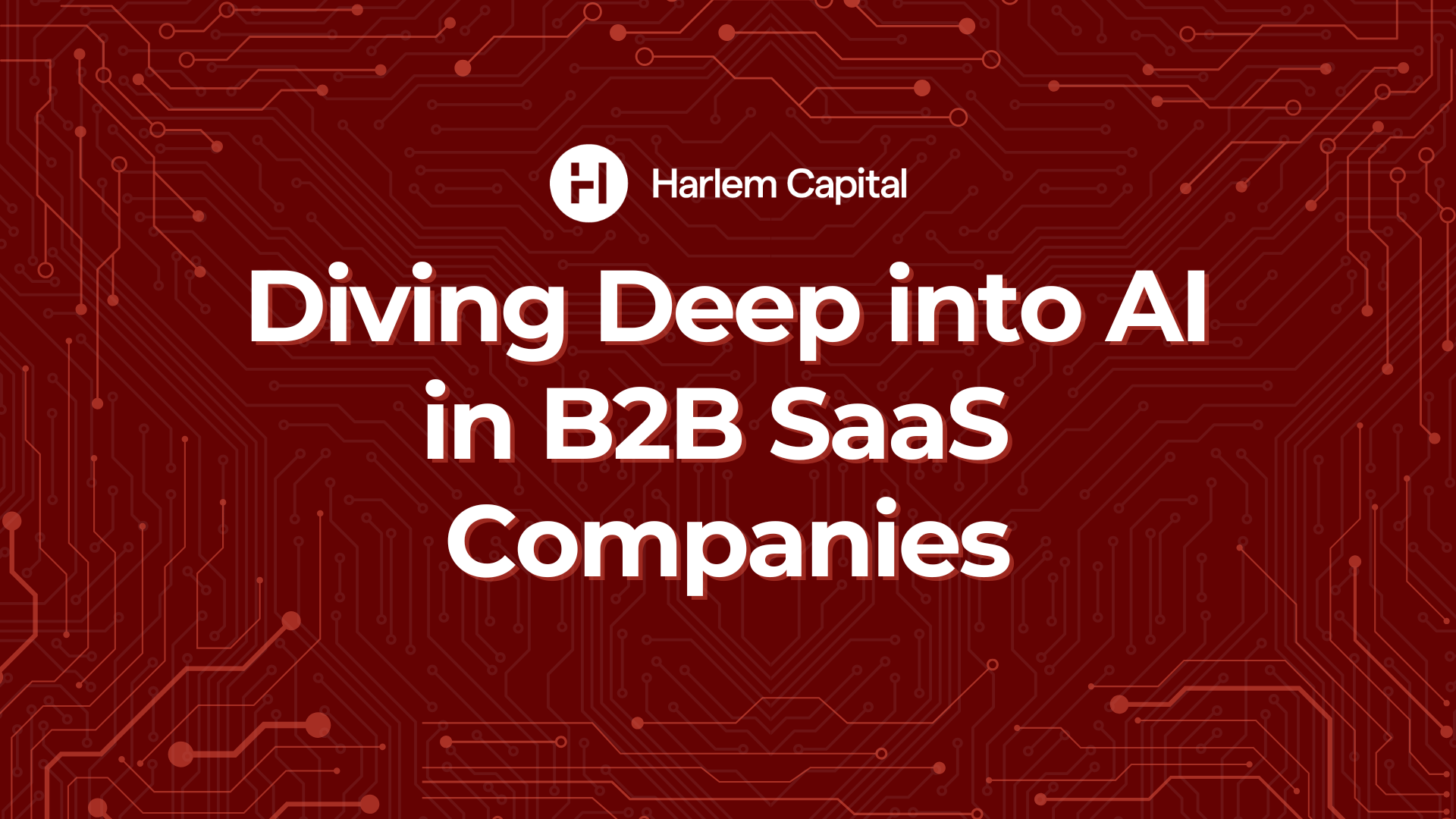Diving Deep into AI in B2B SaaS Companies
by Harlem Capital

By Summer 2024 Intern Megha Agarwal & Partner Brandon Bryant
As artificial intelligence continues to revolutionize various sectors, its impact on B2B software-as-a-service (SaaS) is particularly noteworthy. The rapid advancements in AI technologies, especially in generative AI, have unlocked unprecedented opportunities for businesses to enhance both internal operations and customer-facing services. From automating repetitive tasks to delivering personalized customer experiences, AI-driven solutions are becoming indispensable for B2B SaaS companies seeking to maintain a competitive edge in the market.
In this article, we delve into the transformative potential of AI in the B2B SaaS landscape, highlighting key startups and their innovative applications of AI. We explore the strategic advice from leading investors on integrating AI into product roadmaps, the importance of founder prioritization of AI enablement, and the promising verticals poised for AI disruption. Join us as we uncover the insights from Harlem Capital’s founder movement in B2B AI, spotlighting the startups that are setting new benchmarks in the industry. For more details, please see our full report here.

Lessons from Founders and Investors
We spoke with several founders and investors actively operating or investing in B2B SaaS companies that are leveraging AI. From our discussions, four key lessons emerged:
1. AI integration as a continuous journey: Both founders and investors emphasize that integrating AI is not a one-time project but an ongoing process. Companies must continuously iterate and evolve their AI capabilities to stay ahead. This includes regular updates to AI models, gathering feedback from end-users, and adapting to new technological advancements. The dynamic nature of AI means that businesses must remain agile and committed to constant improvement.
2. Customer-centric AI development: Successful B2B SaaS companies prioritize AI solutions that directly address customer pain points and enhance user experience. Founders stress the importance of engaging with customers to understand their needs and challenges. By focusing on customer feedback and developing AI features that provide tangible benefits, companies can create more value and foster stronger customer loyalty. Investors look for companies that have a clear strategy for integrating customer insights into their AI development roadmap.
3. Balancing innovation with practicality: While AI offers exciting possibilities, it’s crucial for B2B SaaS companies to balance innovation with practical application. Founders highlight the need to deploy AI solutions that deliver immediate, measurable benefits rather than getting caught up in hype – particularly with limited teams and capacity and limited access to affordable tools and solutions. Practical AI applications, such as automating routine tasks or enhancing data-driven decision-making, are often more impactful than speculative projects. Investors favor companies that demonstrate a pragmatic approach to AI, focusing on achievable milestones and clear return on investment.

Assessing the Market Opportunity
The integration of AI across various sectors has begun to not only propel innovations, but also reshape operational landscapes and generate substantial economic impact. As businesses increasingly adopt AI technologies, certain areas emerge as particularly ripe for this transformation. Our analysis highlights four key dimensions that define the most promising use case opportunities for AI in B2B SaaS:
1. Operational efficiency and cost reduction: Founders prioritize AI enablement use cases that are originally operationally intensive and where AI can drive significant cost efficiencies, ideally where there is a high volume of routine and repetitive tasks. By automating these processes, AI solutions can dramatically reduce costs and increase efficiency.
2. Enhanced customer experience and personalization: As the modern consumer increasingly expects personalized interactions, companies can benefit from detailed customer insights brought by AI integration. Particularly for companies that have digital-native customer base, the tailored experiences that can be brought by AI-driven personalization and responsiveness offer a fertile ground for growth and provide competitive advantages to companies that effectively implement.
3. Data-driven decision making: Companies that manage extensive datasets find exceptional value in AI’s ability to sift through complexity, deliver actionable insights, and enhance analytical capabilities. By integrating AI, businesses can leverage advanced analytics to parse through their data, enabling more precise decision-making. Particularly crucial for enterprises with sophisticated data environments, AI’s potential to uncover hidden insights and optimize decision processes offers a substantial competitive edge.
4. Innovation and competitive advantage: Finally, AI holds transformative potential as an innovation driver in industries traditionally resistant to change. By embedding AI into their core operations, companies can discover new methods to outpace competition and redefine market standards. The effectiveness of AI in fostering innovation is significantly amplified when aligned with external catalysts such as regulatory shifts, evolving market demands, or acute labor challenges. This application of AI not only addresses immediate operational efficiencies but also sets the stage for long-term strategic advantages, making businesses more agile and responsive to emerging opportunities.

Where are we seeing horizontal opportunities for AI enablement?
In the rapidly evolving landscape of B2B SaaS, AI is increasingly recognized as a crucial lever for enhancing operational efficiency and driving growth across various business functions. Founders are capitalizing on AI’s potential in areas such as customer service, cybersecurity, and customer relationship management. The integration of AI not only boosts productivity but also enhances sales capabilities, enabling more sophisticated and efficient customer interactions. As businesses continue to embrace AI to refine their operations, the startup ecosystem is responding dynamically, with a growing number of solutions designed to streamline company workflows and decision-making processes. This broad applicability of AI across different horizontal needs underscores its critical role as a foundational tool in the modern digital toolkit.

How do you identify which industries are ripe for AI enablement?
Identifying which industries are particularly ripe for AI enablement is no small feat. AI’s impact varies significantly across industries, influenced by specific characteristics that either enhance or inhibit its integration.
Through our research, we have found that industries rich in data, characterized by repetitive tasks, and having a strong need for customer personalization stand to gain the most from AI technologies. However, sectors that rely on high stakes decision-making, have a strong reliance on creativity, and deal with heavy regulation and compliance face greater challenges with AI adoption. Today, industries like media and entertainment, logistics, and tech and software are currently at the forefront, rapidly adopting AI to capitalize on its transformative potential.
Despite challenging hurdles for some industries today, the potential for AI to revolutionize all industries exists and will likely increase as AI technology matures and industry leaders navigate the regulatory landscapes.

What does the investment landscape look like for AI in B2B Saas?
The investment climate for AI in B2B SaaS has been particularly vibrant, drawing significant attention from venture capital firms. Prominent investors such as Sequoia, Andreessen Horowitz, Lightspeed, and Insight Partners have been key players in fostering this growth.
Although growing for prior years, the COVID-19 pandemic catalyzed a significant spike in AI investments in 2021, as companies sought digital solutions to new and evolving challenges. While the initial surge has since moderated, investment activity remains robust, indicating sustained confidence in the AI-driven transformation of the B2B SaaS sector. This enduring interest suggests a strong belief in the long-term value of AI technologies, not just as a temporary fix but as a cornerstone of future enterprise operations.

Where To Go From Here
As AI continues to redefine the landscape of B2B SaaS, founders have a critical opportunity to harness this technology to enhance their competitive edge and operational efficiency. Here are strategic steps to effectively integrate AI into your business:
1. Prioritize scalability and flexibility: Leverage AI to make your operations more adaptable to market changes and customer needs. This means integrating AI solutions that not only address current challenges but also scale with your growth, ensuring that your technology investments continue to deliver value over time.
2. Focus on customer-centric solutions: Utilize AI to deepen customer relationships through personalized experiences and predictive analytics. This will not only enhance customer satisfaction and loyalty but also help your company stand out in crowded markets. Founders should concentrate on collecting and analyzing customer data to tailor services and products that meet the unique needs of their target audience.
3. Enhance decision-making with data: Implement AI tools that provide real-time data analysis and actionable insights. This will empower your team to make informed decisions quickly and accurately, thereby improving your company’s responsiveness and strategic agility.
4. Mitigate risks with AI: Use AI to identify potential risks early and automate compliance processes. This proactive approach to risk management can protect your company from costly errors and enhance your reputation for reliability and security.
5. Invest in talent and training: As AI technologies evolve, the need for skilled personnel to manage and implement these solutions grows. Invest in training your team and attracting talent that can navigate the complexities of AI, ensuring that your workforce is equipped to leverage AI tools effectively.

Our journey through the dynamic and evolving landscape of AI in B2B SaaS has provided us with profound insights into how this technology is reshaping industries and enhancing the capabilities of businesses. Our discussions with founders and investors, coupled with rigorous analysis, have highlighted the transformative potential of AI to streamline operations, enhance customer engagement, and drive data-informed decision-making.
We have identified key areas where AI is not just a tool of convenience but a critical driver of innovation and market competitiveness. Industries that are data-rich and operationally intensive, such as logistics, media, and software, are already reaping substantial benefits from AI integrations. Yet, the promise of AI extends beyond these sectors, offering potential breakthroughs in even the most traditionally conservative fields.
The investment outlook remains bullish, with venture capital continuing to fuel advancements in AI technologies, reflecting a robust confidence in the strategic value of AI. The engagements we have tracked indicate a clear consensus on the necessity of AI as a cornerstone for future business operations across various sectors.
As we look forward, B2B SaaS companies stand at a pivotal point. We’re excited to see where the next wave of AI adoption takes us and them.
About Harlem Capital Partners
Harlem Capital (HCP) is an early-stage, diversity-focused venture capital firm. HCP makes initial investments of $1mm to $2.5mm in U.S. seed rounds for 10-15% ownership.
Stay updated on Harlem Capital news by subscribing to our monthly newsletter, follow us on LinkedIn, X, and Instagram.


